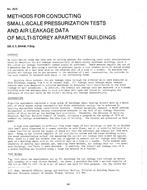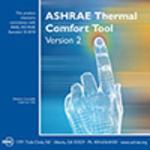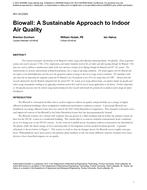Enthalpy exchangers are frequently employed to transfer heat and water between the supply and exhaust airstreams of mechanical ventilating systems. Concern has been expressed that some indoor-generated air pollutants, especially formaldehyde, may be transferred between airstreams by this type of heat exchanger and, thus, returned to the indoor space. This paper describes an experimental study in which the formaldehyde, tracer gas, and water vapor transfer rates in two enthalpy exchangers were measured. The first exchanger uses a crossflow core fabricated from a treated paper. The core of the second heat exchanger is a rotating heat wheel coated with lithium chloride. To reduce the transfer of gases by air leakage, each core was installed in a specially fabricated case. Only 5 to 8% of the two tracer gases and 7 to 15% of the formaldehyde injected into the exhaust airstream was transferred to the supply airstream. Therefore, formaldehyde transfer between airstreams by processes other than air leakage does not seriously compromise the performance of these enthalpy exchangers. Theoretical calculations indicate, however, that the transfer of water vapor between airstreams in enthalpy exchangers can significantly diminish their ability to lower indoor formaldehyde concentrations because of the positive coupling between indoor humidity and the emission rates of formaldehyde from building materials.
Citation: Symposium, ASHRAE Transactions, 1985, vol. 91, pt. 1B, Chicago
Product Details
- Published:
- 1985
- Number of Pages:
- 14
- File Size:
- 1 file , 1.4 MB
- Product Code(s):
- D-CH-85-03-3


